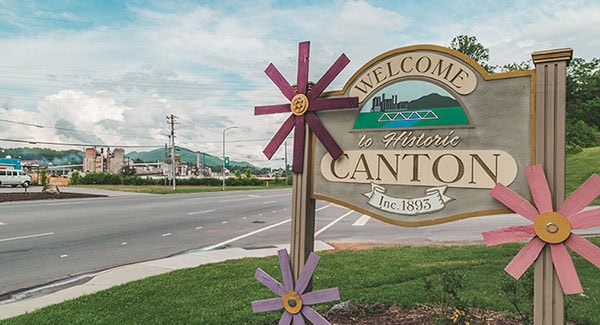Last Updated on March 30, 2023
At 1.5% in Waynesville and 1.4% in greater Haywood County, according to 2022 census numbers, the local African American population isn’t necessarily strong in numbers. But compared to their portion of the population, the community has an outsized impact on local history. There have been many Black leaders and pioneers in Waynesville over the years. And thanks to the work of a project called Lift Every Voice!, we have a better record of the oral histories of the Black community than ever before.
This February, take some time to learn about and celebrate the rich African American history of Haywood County, NC. We can help you get started. Here are three places in and around Waynesville to visit this Black History Month.
Sunburst
Unfortunately, you can no longer see the bustling mill town of Sunburst; it has long been enveloped by the waters of Lake Logan. But its short chapter has left a lasting legacy for the African American community in Waynesville.
Around the turn of the 20th century, demand for logging began to soar. Canton’s Champion Fibre Company purchased 40,000 acres of timberland in an area dubbed “Sunburst” because of the way the sun rose over the mountains. Beginning in 1905, a “significant, sophisticated” community of hundreds of laborers and their families took shape. Some of these homes even had electricity, running water, and telephone service—relatively modern amenities for any household at the time. But Sunburst was best known for its relatively egalitarian community during the height of Jim Crow laws. Schools were segregated, but most other community amenities “were relatively free of discrimination”.
Unfortunately, the town only lasted for a couple decades. A pair of fires in the early 1920s closed the mill for good. The company moved operations to Waynesville, and in 1932, the area was flooded forever to create Lake Logan.
Lake Logan Episcopal Center, 154 Suncrest Mill Road, Canton | lakelogan.org
WYSE-AM
This local radio station in Canton has changed call sign and format a number of times over the last 70-plus years. But starting in 1949, WWIT 970 AM (which stood for “Where the Wheels of Industry Turn”) was the local station for modern music.
From 1953–1963, young listeners would tune in every weekday from 5:00–6:00 PM to listen to the recognizable voice of Nathaniel Lowery, known on air as “Nat the Cat“. Lowery diverted from the usual gospel and “mountain” songs of most local stations at the time. He was singularly responsible for introducing black jazz and pop music to Haywood County. Promoting the likes of Elvis, The Platters, Jackie Wilson, and The Temptations, Nat the Cat played music that “shattered color lines“. And as popular as the music was, Lowery himself was just as popular. His show lasted until the station was sold in the early 1960s.
Lowery passed away in 2008 and is buried in Clyde. As of 2020, Alice Lowery, his widow and a local pioneer in her own right, still lives in Canton.
New Clyde Highway, Canton | wisesportsradio.com
Pigeon Street School
This location is one of the newest listings on the National Register of Historic Places listings in Haywood County. But its history predates its construction in 1957.
Designed by Asheville architect Lindsey Madison Gudger, Pigeon Street Elementary School (which ran through grade seven) was the only public school built in the late 1950s for one of Waynesville’s historically African American neighborhoods, the Pigeon Street community. According to the building’s application for historic status, it “replaced the Rosenwald school built in 1924 that was located across the street from the current school building.” From 1948 until schools desegregated in 1966, students continuing their education would have to travel to Canton to attend Haywood County’s only high school, Reynolds High.
From 1966–2001, the Pigeon Street School building served as the Instructional Materials Center for the county schools. The nonprofit Pigeon Community Multicultural Development Center now owns and maintains the building.
450 Pigeon Street, Waynesville | pcmdc.org
Make your own history in Waynesville, NC!
It’s easy to discover new local history, as well as outdoor adventures, in Waynesville every day. High peaks surround the town, once billed as the Gateway to the Smokies and now the seat of Haywood County. But Waynesville’s proximity to Asheville offers residents the best amenities of a larger city while still holding on to its small-town atmosphere. For instance, the recently restored Frog Level Historic District is now home to a collection of small galleries, a coffee roastery, and a microbrewery. From outdoor adventures to cozy spots downtown, Waynesville, NC welcomes people from many different backgrounds to visit and stay for life.
Does that sound like the perfect lifestyle for you? Find your dream home in Waynesville now!




